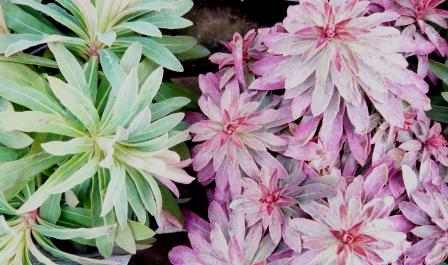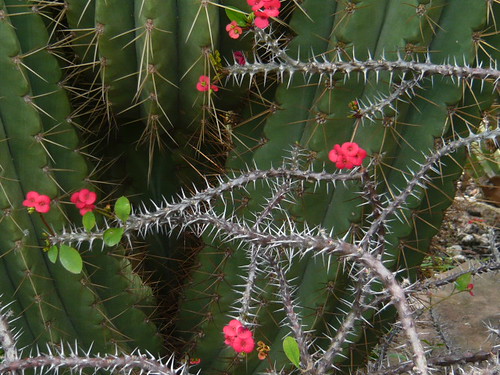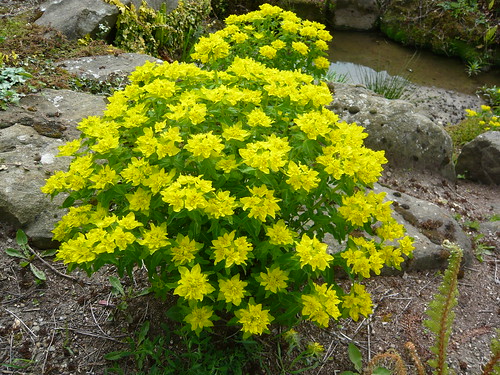Growing Top Ten Euphorbia
The most popular Euphorbia purchase in December is the poinsettia but many cacti are also Euphorbias.

Euphorbia is one of the most diverse genera in the plant kingdom with over 2100 species. Members of the family and genus are sometimes referred to as Spurges. They range from annual weeds to trees. They all have a latex sap which can be an irritant and a unique flower structure. Many Euphorbias are succulent and the characias species are an architectural perennial with fresh bluish-green foliage.
Top Ten Euphorbias
- Euphorbia milii or Crown of Thorns is a succulent houseplant which has spiny stems and comes from Madagascar. Easy to grow in cool, bright conditionsit is propagated from tip cutings.
- E. griffithii ‘Fireglow’ one of the few euphorbias with orange-tinted bracts and a red flush to its leaves. ‘Fireglow’ has the Award of Garden Merit (AGM).
- Euphorbia pulcherrima is the plant often associated with Christmas the Poinsettia with flame red bracts or cream and pink varieties for indoor growing.
- Euphorbia schillingii the vigorous stems shoot up each spring, creating a sizeable mound topped with large heads of yellow flowers. Each lance-shaped leaf is elegantly picked out with a noticeable white midrib. The RHS has given it the AGM.
- The evergreen euphorbias are well worth highlighting in large ornamental pots, making first-rate focal points. E. characias: one of the most popular euphorbias, it’s a sun-loving, shrubby plant. It produces a huge, almost cylindrical head of dark-eyed flowers from late spring to summer. There are several good forms including Wulfenii with an AGM.
- E. mellifera has large, green, arching and lush leaves smother its numerous stout stems. The sweet aroma from its flowers, produced in hot summers attracts a multitude of insects. Slightly tender, it’s best grown in containers so it can be moved to a mild, sheltered position over winter. It has AGM accreditation.
- E. myrsinites tiny evergreen euphorbia, just 10cm (4in) high and 30cm (1ft) wide, that enjoys a dry, baking position and is very effective at sprawling over a dry stone wall. Its greyish leaves are slightly succulent and triangular-shaped, and packed right around the stems – good fun. Another AGM Euphorbia.
- E. rigida similar in appearance to E. myrsinites, but growing twice as big – with upright, evergreen stems and a handsome clump of sea-green leaves.
- Euphorbia amygdaloides var. robbiae can thrive in the darkest recesses of the garden, such as under a heavy tree canopy. There is also a great purple foliage form.
- Euphorbia griffithii Fireglow has bright red bracts
Botanical dermatology database for Euphorbia deightonii – Euphorbia kotschyana Euphorbia lactea – Euphorbia orientalis Euphorbia paganorum – Euphorbia punicea Euphorbia ramosissima – Euphorbia virosa

Euphorbia Seeds Online
See: Pics of Euphorbia at Oxford Botanic Gardens
National Collections of Euphorbia:
University of Oxford Botanic Garden   Website: www.botanic-garden.ox.ac.uk
DS Witton  Sheffield Tel: (01909) 771366


10 thoughts on “Growing Top Ten Euphorbia”
I am a big fan of Euphorbia, it has such unusual foliage, interesting “flowers”, and drought resistant-thanks for the reminder…I’ll have to go out and get some for the garden.
Comments are closed.